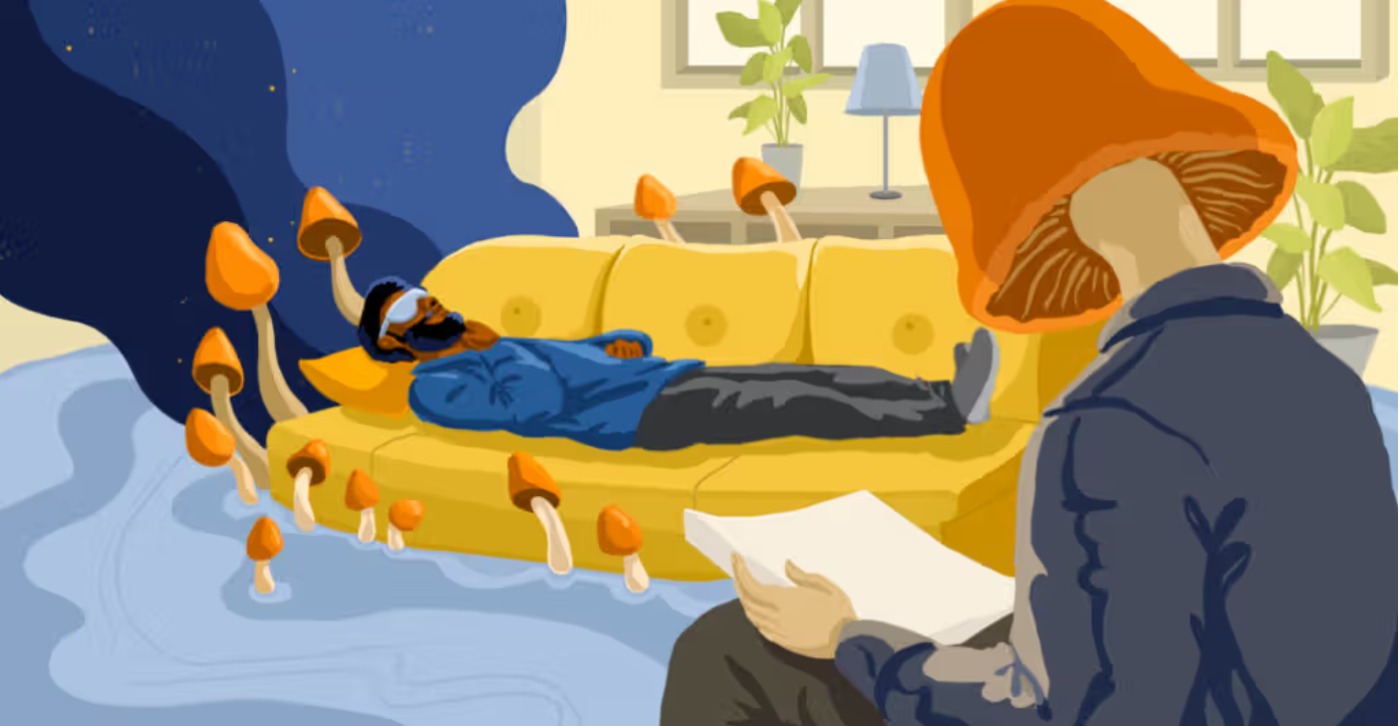Blog
Psychedelic Therapy
What is Psychedelic Therapy?
Psychedelic therapy is a specialized therapeutic approach that combines the use of psychedelics with psychotherapy techniques. It involves the careful administration of substances in a supportive setting, accompanied by trained healthcare professionals, and differs significantly from recreational use of psychedelics.
Psychedelic therapy uses both plant-based compounds and chemical compounds such as psilocybin, MDMA, ketamine, and LSD to treat mental health disorders, addiction, and other ailments. It can be particularly beneficial for individuals who haven’t responded to traditional treatment options.
How Does Psychedelic Therapy Work?
While traditional antidepressants can take weeks to show effects, many psychedelic studies have demonstrated immediate improvement in symptoms, sometimes with just a single dose. But how does it work? Researchers are still unraveling the full mechanism, but they hypothesize the following:
- Targeting Serotonin Receptors: Psychedelics cross the blood-brain barrier and target serotonin receptors, heightening the senses, creating hallucinations, and instilling a sense of connection.
- Supporting Neuroplasticity: Psychedelic compounds enhance the brain’s ability to learn and change, known as neuroplasticity.
- Synaptogenesis: This process allows greater communication between neurons in the brain. Researchers believe that important pathways disrupted by mental health disorders are rebuilt during this process.
Psychedelic research also explores whether the hallucinations themselves drive change. Users can have profoundly transformative experiences that shift their mindset and thought patterns, helping them see their life and circumstances in a new light.
Types of Psychedelics Used in Therapy
A variety of psychedelics are used in therapy, both plant-derived and chemical compounds. While some programs, like Sero, focus on psilocybin, other powerful psychedelics include MDMA, ketamine, LSD, DMT, ayahuasca, and iboga. Here’s a closer look at some of the most popular options:
Psilocybin Therapy: The active compound in magic mushrooms, psilocybin, has shown potential as a powerful, immediate, and long-lasting treatment for anxiety, depression, PTSD, addiction, OCD, and other mental health disorders.
Ketamine Therapy: As one of the first legal psychedelic drugs for mental health disorders, ketamine has shown promise in treating severe depression. Most ketamine therapy programs involve high doses of ketamine combined with talk therapy or trauma-based therapy to address the underlying causes of mental health conditions. Results can last between 6 to 8 weeks, with some users experiencing longer-lasting effects.
MDMA-Assisted Therapy: Often used as an alternative treatment for PTSD, MDMA has demonstrated effectiveness in reducing PTSD symptoms. A robust three-phase study showed that 67% of participants were cured of PTSD symptoms after three treatments, and 88% had significantly reduced symptoms.
LSD Therapy: LSD, a plant-derived psychedelic, is used to treat addiction (particularly alcoholism) and anxiety. Like other psychedelic therapies, it is used alongside talk therapy to address the underlying causes of mental health conditions.
Types of Psychedelic Therapy
Psychedelic therapy can be conducted in various ways, with the most common being:
Independent Experience Followed by Integration: In this format, a participant undergoes their experience independently, usually with a trained professional nearby, and later reconvenes with their therapist or facilitator to integrate the insights gained during the journey.
Guided Experience: Participants are usually given lower doses of a psychedelic compound while a therapist or facilitator works with them to address traumas and underlying mental health issues. These sessions typically include intake, preparation sessions, and follow-up.
Conditions Treated with Psychedelic Therapy
Depression and Anxiety: Numerous studies have shown that psychedelic therapy can be a powerful alternative treatment for depression and anxiety. Psilocybin, in particular, has been shown to lead to significant improvements in mood, anxiety, and overall well-being in patients with treatment-resistant depression, with effects lasting up to a year after treatment.
Post-Traumatic Stress Disorder (PTSD): Ongoing studies suggest that psilocybin and MDMA are the most effective psychedelics for treating PTSD.
Addiction: Psychedelic therapy has shown promise in treating addiction, which often co-occurs with depression, anxiety, and PTSD. Psilocybin and iboga are particularly successful in this regard.
Eating Disorders: Research indicates that individuals with eating disorders can benefit from psychedelic therapy. Participants in psilocybin trials reported improved body image and healthier habits.
Critical Illnesses: Psychedelics are approved for alleviating anxiety in individuals with terminal diagnoses. Studies have shown that psilocybin and other psychedelic drugs can help ease depression and anxiety associated with terminal illnesses.
How Psilocybin Therapy Works
Although these therapies are relatively new in the Western world, and approaches may vary, psilocybin therapy typically involves three phases:
- Consultation: Clinicians discuss the patient’s conditions, ensure they are a good fit for the treatment, and check for contraindications.
- Ingestion: The participant ingests the psychedelic compound in various formats such as tea, injection, chocolate, or capsule. The number of treatments varies by compound:
- Psilocybin and LSD usually involve two or more sessions.
- Ketamine involves 6-12 sessions.
- MDMA typically starts with three sessions.
- Iboga treatment usually involves two traditional ceremonies.
- Integration: The participant and therapist discuss the experience and work together to integrate the insights and lessons gained.
Risks of Psychedelic Treatment
Psychedelics are generally low risk, especially when used in a clinical or therapeutic setting. However, there are some transient side effects like raised blood pressure, increased heart rate, and headaches. Certain medications, medical conditions, and mental health disorders can contraindicate psychedelics, so a trained facilitator will screen for these before treatment.
TheraPsil: Access to Psychedelic Therapies
TheraPsil is a nonprofit organization dedicated to training healthcare professionals in MDMA and psilocybin-assisted therapy and advocating for legal access to psychedelic therapy. Their clinical protocol, which includes a three-phase model, provides a standardized approach to psilocybin therapy prioritizing safety and efficacy:
- Preparation Sessions: Establishing trust and goals, creating a safe environment, and setting personalized goals for a meaningful experience.
- Medicine Session: Guided by trained practitioners, the patient undergoes a psychedelic session, exploring altered states of consciousness for therapeutic breakthroughs.
- Integration Sessions: Translating the therapeutic content into practical, sustainable changes in everyday life through structured sessions.
Learn more about TheraPsil’s approach to psilocybin therapy through their resources and video content featuring their founder, Dr. Bruce Tobin.

